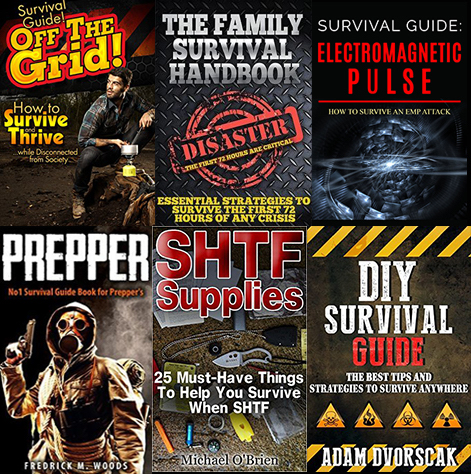The full original article by Christopher Moyer – “Confessions of a Former Apocalypse Survival Guide Writer” came out July 20 on Motherboard: http://motherboard.vice.com/read/i-used-to-write-apocalypse-survival-guides

I present significant chunks of the article here because it provides interesting insights – and even more can be found at the link above.
“The first time I bid on a freelance job to ghostwrite a doomsday survival guide, I was only asked one question: Did I have experience writing for middle-aged Republican men? I told the client that I had experience writing for a wide variety of ages and political affiliations, which was noncommittal enough to be true.
The client said, “Sounds good, bro.”
We were off to the races…
I didn’t know anything about the client, let’s call him Dimitri, other than that he lived in Florida, and that he had about $600 for me if I could pump out 100 pages on how to survive the end of the world. The only way to make a living on writing projects at these prices is to do them quickly. In some cases, freelancers are asked to “spin” extant books—that is, to essentially copy the structure and content of those books but to make them new enough to reasonably (and legally) market them as new products. This is related to, but still distinct from the practice of article spinning, in which the same human-written article is quickly reorganized and reworded to create one or more additional “new” articles. (This is often done by software that has a built-in spintax that replaces keywords in the text with synonyms.)
I had no particular survival expertise, but I could regurgitate reliable reference materials as well as anyone else.
I set to work. My plan was to keep the fringe thinking to a minimum and just provide basic entry-level survival information: ways to purify and store water, what foods worked well for stockpiling, signaling and first aid techniques, methods of cooking without electricity, and so forth…
Ultimately, with that first guide as well as future guides, I was always asked to include more extreme material. “That’s what the audience really wants,” I was told by another client.
But you don’t generally thread it throughout the entire guide. In the case of the 2012 guide, for example, I was eventually asked to explain the Nibiru cataclysm theory but to avoid addressing it until the last chapter. That’s because when the world didn’t end in 2012—and at least part of Dimitri knew it wouldn’t—you’d be able to easily take out the section on Nibiru theory and insert a new chapter about whatever the hot new doomsday theory is, which these days appears to be the threat of an electromagnetic pulse.
The first book went off without a hitch. After that, it became easy enough to get additional projects… For a while they became my primary source of income, and every single time I was hired by a company that catered to the survivalist market, not a traditional publisher….
When the guides are being sold directly from the producers, you’ll often see them bundled with a few bonus guides (maybe only 15 to 25 pages) with clickbait-flavored listicle-type titles: The 25 Biggest Mistakes That Will Get You Killed When the Shit Hits the Fan. 10 Must-Have Bug-Out Pack Items. The 15 Best Survival Guns for Stockpiling. That sort of thing.
Do people buy them? Sure they do. Sales aren’t the goal, though. The idea here is to induct people into a lifestyle, because these same people sell things like wilderness survival courses, subscriptions to survival food delivery services, tools and weapons, and vitamins. Prepping is big business, with Yahoo! Finance reporting that as many as 3.7 million Americans identified themselves as “preppers” in 2013, fueling demand for a multi-billion dollar industry….
By and large, all of my clients seemed like nice, normal people, at least via e-mail and on the phone—I never met a single one in person. But in the end, the longer we worked together, the more comfortable the clients tended to become in expressing their more extreme opinions, as if they’d been holding them in. Often, professional decorum (and with it, sometimes basic grammar and spelling) degraded as time went on.
“Honestly this 2012 stuff is addicting,” reads the last e-mail I ever received from Dimitri, sent at 4:05 AM in October 2009. “I can’t stop researching it lol. Like there are 800 concentration camps right here in the US with ovens, cofins, and all. No prisoners just guards.”
This is, of course, nonsense. But it demonstrates the uncharitable view of humanity that is integral to the worldview of many doomsday preppers, a profoundly bizarre audience to write for.
These are people who believe a thousand-year-old prophecy is about to come true. People who believe most of their loved ones will be dead within a year. People who are preparing for the possibility of killing their neighbors, who presumably will become feral and desperate. People who just might buy 3D printers and extra fancy new UV handheld water purifiers to help ride out the collapse of civilization, but who are probably more likely to spend $10 on PDF downloads of guides with names like Urban Chicken Farming After the Dollar Collapses. These are people who expect they themselves may only have a year left on this planet.
And then I find myself asking the logical next question: Do they really believe that? I don’t think that they do. But they’re hedging their bets anyway….
I submit that disaster preparedness is not inherently a fool’s game and that the kind of prepper described I just described is not the definitive picture. The Red Cross, for example, sells bug-out bags, a staple of any prepper’s gear. How crazy is it to follow the Red Cross’s preparedness advice? Not very. And so much about doomsday prepping is about just having a plan, something most people don’t have.
People do fall through the cracks, and working out ways to take your fate into your own hands is a useful exercise in self-reliance.
Catastrophes do occur with regularity—think Hurricanes Katrina, Rita, and Sandy, to name a few—and when they do, there’s much to be said for having your own preparations in place as opposed to relying completely on government intervention and large-scale relief efforts. People do fall through the cracks, and working out ways to take your fate into your own hands is a useful exercise in self-reliance.
But there’s a fine line between being prepared and being paranoid, and when The Shit Hits the Fan, we’ll all be better off if we’re a little more prepared and a lot less paranoid. It’s not always easy to tell the difference.
As for Dimitri? When the world didn’t end in 2012, he didn’t miss a beat: He produced more e-book guides on becoming a pick-up artist, dominating the competition in Farmville and World of Warcraft, and dealing with problem children. Now, he runs a company that trains and sells attack dogs—and they’re guaranteed to protect you, should the world go to pieces.
I won’t be writing the training manuals.”
- I think financial collapse, social collapse, world war, and martial law are all quite possible in 2016. I still think we might even see end times Bible prophecy unfold over the next few years and really bring TEOTWAWKI. But events haven’t exactly happened on schedule according to my expectations… Maybe nothing horrific will ever happen. But if it does, are you prepared? Do you have a plan?
